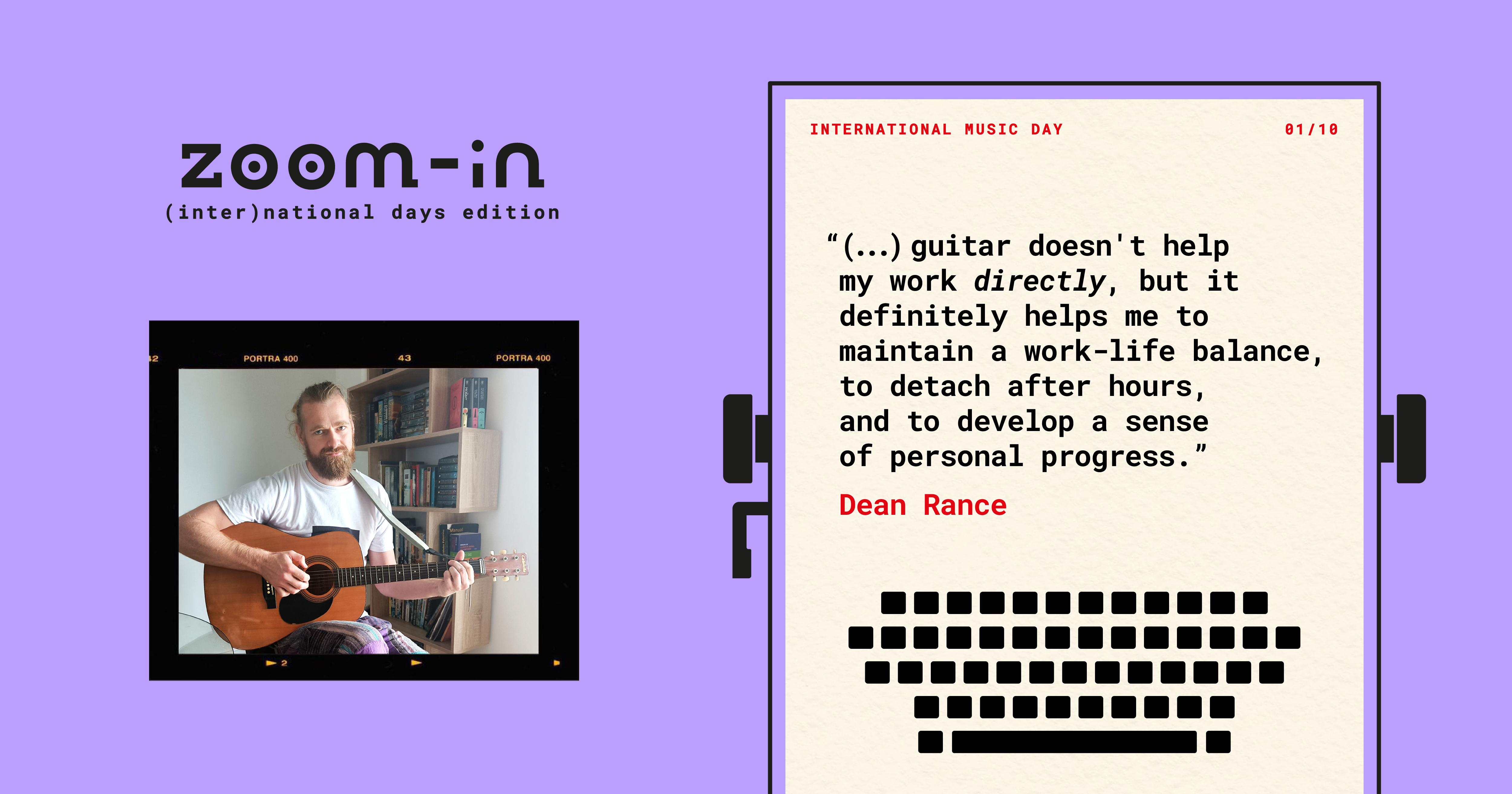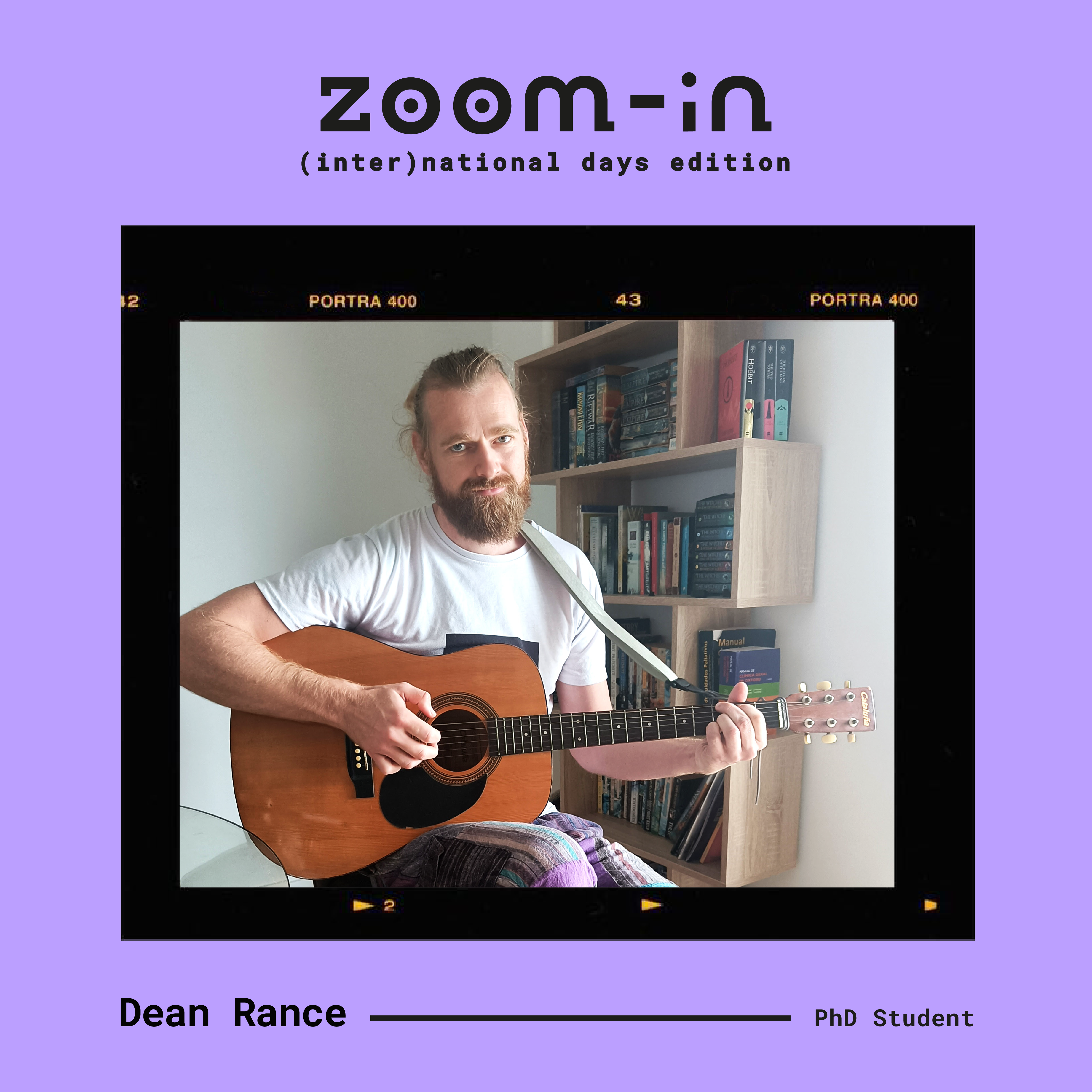On October 1st, people in over 150 countries across the globe will celebrate the power of music to unite and contribute towards a more peaceful, joyful, and harmonious society during International Music Day. Here at the Champalimaud Foundation, we have several budding musicians, so we asked one of them to give us some insight into combining music with science.
Dean Rance has been part of our community since 2020, first with the International Neuroscience Doctoral Programme and now as a PhD Student in the Mathematics of Intelligence and Behavior Lab, where he is focusing on identifying the neural underpinnings of socially-driven behaviour in larval zebrafish. But he also has a musical talent away from the laboratory that he will reveal today…
October 1st is International Music Day, so let’s start with a big question: how important is music to you?
How important it is, that's difficult to estimate. It's like, how important is sunshine during your summer holidays? They'd still be holidays, but the whole tone would change. Being able to play guitar at home is like that: if I'm without a guitar I'll be perfectly fine, but I won't be at home. I guess that puts it on par with books.
So you’re an axe man! When did you first start playing?
I was given my first guitar when I was 16, but I only started learning more than just a few chords and simple songs in my 20s. At the time, I didn't have access to a teacher, just a small book by Ernie Ball to learn the basics from. Friends would pass around print-outs of guitar chords and tabs of classic "acoustic guitar songs", you know, like country or some rock music (think, Wonderwall). Sometimes the chords were just wrong, but we didn't know if we were playing them poorly or what was happening. I think because of all that trial and error, it took a while before I got confident, so playing guitar has mostly been a private thing for me.
Eventually I got more books to learn from, started following YouTube tutorials more, and started playing in public places where I’d also let strangers play my guitar provided they agreed to teach me something - a song, a scale, anything. This helped me to develop confidence, and to learn to laugh at myself, but it never reached a point that playing guitar was something I did for someone other than myself.
It seems that you started playing guitar around the same time you started studying science, so do you feel that being a musician has helped you in any way along the path to becoming a scientist?
Strictly speaking, I didn’t study (much) science. I majored in mathematics and philosophy, neither of which uses a “scientific method”, but both of which can be very analytical. Between finishing my undergraduate and starting my Master’s, I spent a few years “working in industry” as a data scientist, much of which was spent as a freelancer.
To answer your question, guitar doesn't help my work directly, but it definitely helps me to maintain a work-life balance, to detach after hours, and to develop a sense of personal progress. This separation of work and life is every bit as important to a student as it is to a freelancer; while personal development, I believe, is important for separating one’s identity from their work.
If music helps you as a scientist, maybe science can help you as a musician! George Gershwin called music an ‘emotional science’; Vangelis said “Music is science more than art, and it is the main code of the universe.” Given that music could be described as science, manifested (vibrations, sound waves etc.), does your scientific background make it easier (or more difficult!) to learn an instrument?
"Science, manifested" is a funny way to say "engineering". But yes, it's a marvellous feat, approximating log2(3/2) with 7/12 to give us 7 notes in a scale of 12… Who even comes up with that?!
I think my background in mathematics has provided me with a way to understand music when it has not been intuitively clear. Some people just get it, but the rest of us need things explained to us and sometimes it's difficult to find the right framework or language to explain things in. For me, that framework was in part mathematics. Once harmonics were explained in terms of Fourier transforms, it just made sense.
But just being a scientist can also help to learn an instrument. Science requires us to maintain inquisitive, receptive minds. We’re constantly learning and frequently pausing to think about what we’re doing. I believe that practising learning generalises. While much of learning to play an instrument is acquiring procedural knowledge (and science can certainly help us to optimise that), a large component is also declarative: for example, what are the intervals in a scale and how do we create chords from them; how are the notes placed on the fretboard; what are common motifs in different genres; and how does this all fit together? I hope I’m right when I finally pick up another instrument!
What kind of music will you be listening to tonight?
Tonight, probably South Africa’s national anthem! We’ll be playing Tonga in the rugby world cup. But I can tell you what music I’ll be listening to tomorrow night: pop-punk (it’s a guilty pleasure), and in particular the punk legends Blink-182 at the Altice Arena.
If you had asked me on any other day, my answer probably would have been electroswing! I think electroswing is a criminally underappreciated genre, especially with the increase of the popularity of electronic music. Electroswing gets me hyped or keeps me focused: I can run to it, code to it, do dishes to it (no, I can't dance swing, yet). It has the electronic beat that your heart will be entrained to, and the syncopation that will give you arrhythmia: what's not to love? Not that I can nail either electroswing nor pop-punk on an acoustic guitar. I'll usually just play rock, 4/4 time, usually open chords if any, unless I'm practising something particular.
Edited by John Lee, Content Developer of the Champalimaud Foundation Communication, Events and Outreach team.



